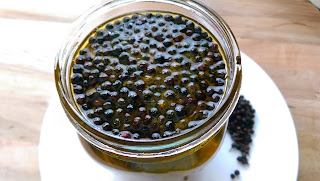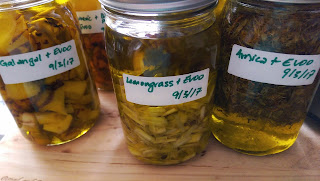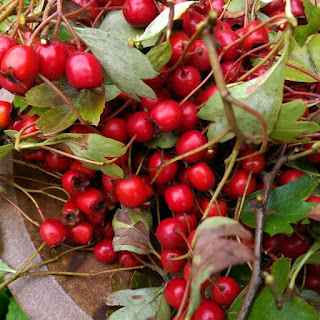Infusing Herbal Oils
As summer is coming to its end and the fall equinox is just a few weeks away (seriously where has the year gone?? poof!) ... I'm thinking it's time to start making infused oils. Noticing as my herbs are getting past their season, infusing them in oil is a great way of preserving their flavor and medicinal properties. And extending past their growing season to be used during the colder months. So you know the rosemary that is needing a little help in your front yard... the sage that's definitely wanting to be used during fall especially with your squashes?? Yeah they can call be infused in oil. And to boot - you get flavorful oils to use both as a herbal
remedy and for culinary use.
Other herbs and flowers to try infusing in oil:
Dried Calendula flowers
Dried Rose Petals
Thyme
Sage
Dried Hibiscus Flowers
Dried Lemon peels
Dried Orange peels
Black peppercorns
Garlic
I'm also feeling rather nostalgic for my favorite root infused oils like ginger, turmeric and galangal....remembering my grandmother's kitchen with all the odd herbs and roots she has in containers preserving-brewing-tincturing-infusing... especially her preserved limes... A flashback memory is SOOOO coming to me at the moment. I remember my grandmother pinching my nose because I'm refusing to drink her bitter concoction as a 9year old ... so I can't breathe and I open my mouth. She makes me down the entire bitter brew... and then proceeds to pop the preserved lime in my mouth ... and tells me in cantonese - suck on it. Now go outside and play. LOL so it's definitely time to be brewing something, don't you think?
There are many choices of base oil to choose from - olive oil, coconut oil, sesame oil, apricot kernel oil, grapeseed oil ... but choose your pick so long as you know or decide how you want to use your infused oil. I'm sure in my grandmother's day there weren't alot of options either (coconut oil, ghee or palm oil) so I'm sticking with good old EVOO (extra virgin olive oil) mostly because I know it's got a longer shelf life. And that's what I'm looking for to help preserve the medicinal properties of what I want to infuse.
For today, I'm infusing a few herbal ingredients - lemongrass, ginger, turmeric, galangal and arnica.
Galangal and ginger has analgesic (relieving pain) and antipyretic (reducing fever) properties and contains gingerol - a constituent which also helps reduce bacterial and fungal infections.
Turmeric has curcumin - a key constituent which has powerful anti-inflammatory effects and is a very strong antioxidant. And when taken with black pepper which has piperine enables the body to absorb curcumin in the bloodstream.
Lemongrass has flavonoids and phenolic compounds and possesses various pharmacological properties such as anti-amoebic, antibacterial, antidiarrheal, antifilarial, antifungal and anti-inflammatory properties and has been shown to also have antimalarial, antimutagenicity, antimycobacterial, antioxidants, hypoglycemic and neurobehaviorial effects. Because of it's antiseptic properties - it has been show to be very effective against infections.
Arnica montana is a natural pain reliever. The herb has medicinal properties to relieve many of the common aches, pains, and injuries that we encounter in our daily lives. The main uses of Arnica include bruising, swelling, pain relief, arthritis, and injuries.
Alright - getting back to the business of infused oils.... so there are a few ways to make infused oils. The cold infusion method, and the heat infusion method.
Cold infusion just means letting the herbs steep in the olive oil in a glass jar for a number of weeks. Some folks do leave the jars out under the sun as a method of solar infusion. You can choose to do this as well. I just find personally infusing in the glass jars with some herbs just work better in the cooler shady place.
Heat infusion - You can choose to infuse the oil using heat via oven, double boiler or crockpot method. If using the oven method, just pre-heat the oven to about 200F, turn off the heat. Place the oven proof bowl and herbs in the oven and let infuse for a few hours up to 24hrs. If you find the heat dissipating, remove the bowl, just heat the oven again and place the bowl back in to steep. I know quite a few people who've used this method with great success. Even more so than the crockpot and doubleboiler methods.
Double boiler method - place herbs and oil in a flame proof glass bowl, place over a simmering pot of hot water. And let it infuse slowly for a few hours. Taking care to ensure no water EVER makes contact with the oil (as it does make the oil go rancid...and rancid oil folks is carcinogenic. So ew, please don't put that into or on your body.)
Crock pot method - that's a little tricky because you can use a crock pot to infuse the oil with your herbs on warm setting - making sure you don't fry your herbs. Or in a mason jar in a crockpot filled with warm water on the warm setting. Taking care to ensure no water EVER makes contact with the oil (remember the rancid oil = carcinogenic remark?) you heat the herbs and oil around 140F - 175F degree for about 3-4 days. Personally it's going to depend on how hot your crock pot runs. My mini one really runs hot and I've fried my herbs even on warm setting before. So I've placed the jars covered in cheese cloth in water in crock pot which works fine.
For the purposes of this article, I chose to do the cold infusion method.
remedy and for culinary use.
Other herbs and flowers to try infusing in oil:
Dried Calendula flowers
Dried Rose Petals
Thyme
Sage
Dried Hibiscus Flowers
Dried Lemon peels
Dried Orange peels
Black peppercorns
Garlic
I'm also feeling rather nostalgic for my favorite root infused oils like ginger, turmeric and galangal....remembering my grandmother's kitchen with all the odd herbs and roots she has in containers preserving-brewing-tincturing-infusing... especially her preserved limes... A flashback memory is SOOOO coming to me at the moment. I remember my grandmother pinching my nose because I'm refusing to drink her bitter concoction as a 9year old ... so I can't breathe and I open my mouth. She makes me down the entire bitter brew... and then proceeds to pop the preserved lime in my mouth ... and tells me in cantonese - suck on it. Now go outside and play. LOL so it's definitely time to be brewing something, don't you think?
There are many choices of base oil to choose from - olive oil, coconut oil, sesame oil, apricot kernel oil, grapeseed oil ... but choose your pick so long as you know or decide how you want to use your infused oil. I'm sure in my grandmother's day there weren't alot of options either (coconut oil, ghee or palm oil) so I'm sticking with good old EVOO (extra virgin olive oil) mostly because I know it's got a longer shelf life. And that's what I'm looking for to help preserve the medicinal properties of what I want to infuse.
For today, I'm infusing a few herbal ingredients - lemongrass, ginger, turmeric, galangal and arnica.
Galangal and ginger has analgesic (relieving pain) and antipyretic (reducing fever) properties and contains gingerol - a constituent which also helps reduce bacterial and fungal infections.
Turmeric has curcumin - a key constituent which has powerful anti-inflammatory effects and is a very strong antioxidant. And when taken with black pepper which has piperine enables the body to absorb curcumin in the bloodstream.
Lemongrass has flavonoids and phenolic compounds and possesses various pharmacological properties such as anti-amoebic, antibacterial, antidiarrheal, antifilarial, antifungal and anti-inflammatory properties and has been shown to also have antimalarial, antimutagenicity, antimycobacterial, antioxidants, hypoglycemic and neurobehaviorial effects. Because of it's antiseptic properties - it has been show to be very effective against infections.
Arnica montana is a natural pain reliever. The herb has medicinal properties to relieve many of the common aches, pains, and injuries that we encounter in our daily lives. The main uses of Arnica include bruising, swelling, pain relief, arthritis, and injuries.
Alright - getting back to the business of infused oils.... so there are a few ways to make infused oils. The cold infusion method, and the heat infusion method.
Cold infusion just means letting the herbs steep in the olive oil in a glass jar for a number of weeks. Some folks do leave the jars out under the sun as a method of solar infusion. You can choose to do this as well. I just find personally infusing in the glass jars with some herbs just work better in the cooler shady place.
Heat infusion - You can choose to infuse the oil using heat via oven, double boiler or crockpot method. If using the oven method, just pre-heat the oven to about 200F, turn off the heat. Place the oven proof bowl and herbs in the oven and let infuse for a few hours up to 24hrs. If you find the heat dissipating, remove the bowl, just heat the oven again and place the bowl back in to steep. I know quite a few people who've used this method with great success. Even more so than the crockpot and doubleboiler methods.
Double boiler method - place herbs and oil in a flame proof glass bowl, place over a simmering pot of hot water. And let it infuse slowly for a few hours. Taking care to ensure no water EVER makes contact with the oil (as it does make the oil go rancid...and rancid oil folks is carcinogenic. So ew, please don't put that into or on your body.)
Crock pot method - that's a little tricky because you can use a crock pot to infuse the oil with your herbs on warm setting - making sure you don't fry your herbs. Or in a mason jar in a crockpot filled with warm water on the warm setting. Taking care to ensure no water EVER makes contact with the oil (remember the rancid oil = carcinogenic remark?) you heat the herbs and oil around 140F - 175F degree for about 3-4 days. Personally it's going to depend on how hot your crock pot runs. My mini one really runs hot and I've fried my herbs even on warm setting before. So I've placed the jars covered in cheese cloth in water in crock pot which works fine.
For the purposes of this article, I chose to do the cold infusion method.
Gather your herbs. And if they are still relatively intact, chop them up semi-finely. The more surfaces the oil is allowed to have contact with, the more medicinal properties it infuses with the oil. So for roots - I would chop them up and then use a mortar and pestle to pound it. Fill up your glass jar about 1/2 way to 2/3 way up. And cover the herbs with olive oil to about an inch above and leaving about 1/2 inch to 1 inch space above it.
Put the lid back on and place in a cool area. Place it on a plate or tray as you let it steep just in case the oil bubbles over. Trust me, as you have some hot days during those random spikes in late summer, oil does expand and the herbs do release bubbles of gas... and oil starts spilling over despite the sealed lid. In general, let the herbs infuse for about 4-6 weeks. Shaking the herbs and oil every day or so.
BTW, I don't know about you but I don't have a calendar tracking all my herbs... there should totally be an app for that :) so it's a good idea to label your lovely potions... and date them. So you know when you started infusing them, when it's time to strain.
BTW, I don't know about you but I don't have a calendar tracking all my herbs... there should totally be an app for that :) so it's a good idea to label your lovely potions... and date them. So you know when you started infusing them, when it's time to strain.
When it's done infusing (cold infusion and heat infusion), you strain the herbs. Again taking care not to introduce any water into the oil. Store and label your jars with the name of the herb used, the type of oil and date you bottled it. Expiration is going to depend on how you store the infused oil and if it goes rancid or musty. So that's one of the reasons I don't put an expiration date. Go by the smell of the oil.
So what can you use your lovely infused oils for? Oh so many many uses in so many ways!
Culinary Uses - You can make infused oils for culinary purposes... lavender oil, rosemary oil, sage oil or lemongrass and ginger oil(yummy !!!) that you can cook with. Like roasting potatoes tossed in the infused olive oil... or tossing squash ravioli with sage infused oil! Or garlic and thyme infused oil on chicken ...Getting ideas yet?
Beauty purposes - You can pour a little lavender infused oil into your bathtub for a luxurious anti-stress soak. Or use the infused oil as a little moisturizer as you massage it into your skin after a shower. Or use hibiscus infused oil to massage into your scalp to help hair growth. (A topic for a new post I promise - beauty treatments using herbs and fruits you have available). Use it as a perfume oil - dab a little on your wrist and behind your ears!
Herbal remedies - Use the ginger or arnica oil like a pain liniment or pain relief oil. Or even ginger and cayenne pepper infused oil. Or use the herbal oil as a sunburn oil (e.g. calendula oil) , or diaper rash oil (lavender oil is great for this)...
Additions to other herbal remedies or products - you can use infused oils to add when making salves, lip balms, solid perfumes.
So you can tell , the possibilities are endless!!! So what are you waiting for? Go on... go infuse your oil-tantastic potions!
Note
Reference links to heat infusion method
- https://www.anniesremedy.com/chart_remedy_herbaloil.php
- https://www.diynatural.com/easy-herbal-oil-infusion/
- https://blog.mountainroseherbs.com/making-herbal-infused-oils
Reference to additional information for the roots I've used
Galangal
- http://www.home-remedies-for-you.com/herbs/galangal.html
- http://www.botanical.com/botanical/mgmh/g/galang01.html
- https://www.anniesremedy.com/alpinia-officinarum-galangal-root.php
Ginger
- http://www.medicalnewstoday.com/articles/265990.php
- https://draxe.com/10-medicinal-ginger-health-benefits/
- https://www.bbcgoodfood.com/howto/guide/ingredient-focus-ginger
- https://www.ncbi.nlm.nih.gov/books/NBK92775/
Lemongrass
- https://www.organicfacts.net/health-benefits/herbs-and-spices/health-benefits-of-lemongrass.html
-https://www.ncbi.nlm.nih.gov/pmc/articles/PMC3217679/
- http://www.naturalalternativeremedy.com/top-9-health-benefits-of-lemongrass/
Turmeric
- https://www.anniesremedy.com/curcuma-longa-turmeric.php
- http://www.healthline.com/nutrition/top-10-evidence-based-health-benefits-of-turmeric
- https://wellnessmama.com/5297/turmeric-uses/
Arnica
- http://www.arnica.com/category/arnica-uses/
- http://www.umm.edu/health/medical/altmed/herb/arnica
- https://www.drweil.com/vitamins-supplements-herbs/herbs/arnica/
So what can you use your lovely infused oils for? Oh so many many uses in so many ways!
Culinary Uses - You can make infused oils for culinary purposes... lavender oil, rosemary oil, sage oil or lemongrass and ginger oil(yummy !!!) that you can cook with. Like roasting potatoes tossed in the infused olive oil... or tossing squash ravioli with sage infused oil! Or garlic and thyme infused oil on chicken ...Getting ideas yet?
Beauty purposes - You can pour a little lavender infused oil into your bathtub for a luxurious anti-stress soak. Or use the infused oil as a little moisturizer as you massage it into your skin after a shower. Or use hibiscus infused oil to massage into your scalp to help hair growth. (A topic for a new post I promise - beauty treatments using herbs and fruits you have available). Use it as a perfume oil - dab a little on your wrist and behind your ears!
Herbal remedies - Use the ginger or arnica oil like a pain liniment or pain relief oil. Or even ginger and cayenne pepper infused oil. Or use the herbal oil as a sunburn oil (e.g. calendula oil) , or diaper rash oil (lavender oil is great for this)...
Additions to other herbal remedies or products - you can use infused oils to add when making salves, lip balms, solid perfumes.
So you can tell , the possibilities are endless!!! So what are you waiting for? Go on... go infuse your oil-tantastic potions!
Note
Reference links to heat infusion method
- https://www.anniesremedy.com/chart_remedy_herbaloil.php
- https://www.diynatural.com/easy-herbal-oil-infusion/
- https://blog.mountainroseherbs.com/making-herbal-infused-oils
Reference to additional information for the roots I've used
Galangal
- http://www.home-remedies-for-you.com/herbs/galangal.html
- http://www.botanical.com/botanical/mgmh/g/galang01.html
- https://www.anniesremedy.com/alpinia-officinarum-galangal-root.php
Ginger
- http://www.medicalnewstoday.com/articles/265990.php
- https://draxe.com/10-medicinal-ginger-health-benefits/
- https://www.bbcgoodfood.com/howto/guide/ingredient-focus-ginger
- https://www.ncbi.nlm.nih.gov/books/NBK92775/
Lemongrass
- https://www.organicfacts.net/health-benefits/herbs-and-spices/health-benefits-of-lemongrass.html
-https://www.ncbi.nlm.nih.gov/pmc/articles/PMC3217679/
- http://www.naturalalternativeremedy.com/top-9-health-benefits-of-lemongrass/
Turmeric
- https://www.anniesremedy.com/curcuma-longa-turmeric.php
- http://www.healthline.com/nutrition/top-10-evidence-based-health-benefits-of-turmeric
- https://wellnessmama.com/5297/turmeric-uses/
Arnica
- http://www.arnica.com/category/arnica-uses/
- http://www.umm.edu/health/medical/altmed/herb/arnica
- https://www.drweil.com/vitamins-supplements-herbs/herbs/arnica/





Comments
Post a Comment